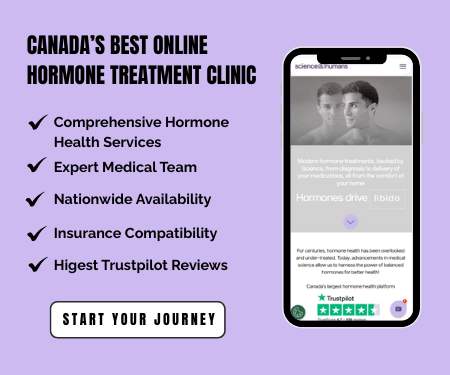A key factor in the growth of muscle mass and strength is the male sex hormone Testosterone (T). By promoting protein synthesis in muscle cells, which leads to the development of new muscle fibres, this process is achieved (1). Testosterone also increases the quantity of nuclei in muscle cells, which can promote muscle growth even more (2).
Age-related Testosterone level declines can result in a loss of muscle mass and strength. Osteoporosis, obesity, and type 2 diabetes are just a few of the health issues that can be exacerbated by low Testosterone levels (3,4).
Testosterone can be increased through a number of ways, including increasing exercise, sleep, improving one's diet, reducing stress, limiting alcohol consumption, and maintaining a healthy weight (3-5). It can also be improved using Testosterone supplements and Testosterone replacement therapy (TRT). We recommend a combination of the above for men hoping to increase T-levels and ultimately improve muscle gain.
The Role of Testosterone in Building Muscle
The development of strength and muscle mass depends heavily on Testosterone. It accomplishes this by promoting the process by which muscle fibres are created and repaired—muscle protein synthesis (1,2,6). Tiny tears form in the muscle fibres during activity. Then, protein synthesis is triggered to repair and rebuild these fibres, making them more robust and substantial. Faster and more effective muscle growth is facilitated by Testosterone by speeding up the rate of protein synthesis. In addition to promoting the production of muscle proteins, Testosterone contributes to the expansion of muscle cell nuclei.
The more nuclei a muscle cell possesses, the greater potential for growth it has because nuclei are the "control centres" of cells. By encouraging the union of myoblasts, Testosterone can increase the number of nuclei in muscle cells, further accelerating muscular growth (1, 2, 6). By encouraging myogenesis, the process of producing new muscle cells, and by modifying the activity of myogenic regulatory factors (MRFs), which regulate muscle cell differentiation and proliferation, Testosterone also has an effect on muscle mass. By encouraging the development and differentiation of muscle cells, these effects lead to an increase in muscular mass and strength.
Does Testosterone Affect Muscle Growth?
Testosterone and muscle gain are popularly connected. It significantly influences muscle growth by facilitating muscular development. It directly affects crucial processes that sculpt your physique. Firstly, it acts like a protein factory, boosting the production of muscle proteins, the very bricks that build your muscles. Secondly, picture it as a repair crew, fixing damaged muscle fibers after a tough workout, setting the stage for stronger muscles. Thirdly, it expands the "brain centers" of muscle cells, their nuclei, allowing them to produce more proteins and grow in size. Lastly, testosterone throws another punch by stimulating the creation of entirely new muscle cells, adding even more mass to your frame. These combined actions translate to one thing: an impressive relation between testosterone and muscle gain.
Is High Testosterone Good for Muscle Growth?
A moderate Testosterone level is necessary for muscle building. However, having too much Testosterone may not always be advantageous (7). Acne, enlarged breasts, and an increased risk of prostate cancer are just a few of the unwanted effects of high Testosterone levels (8). Studies have also suggested that Testosterone levels that are above what is regarded as normal, or supraphysiological levels, may not always result in larger gains in strength or muscle growth. Healthy men were given supraphysiological doses of Testosterone in a study by Bhasin et al. that was published in the New England Journal of Medicine in 1996, and the results showed that while muscle size and strength increased, there was no additional benefit above normal physiological levels of Testosterone (7).
How does Testosterone Contribute to Muscle Gain?
Many individuals frequently resort to using testosterone to build muscle. Given its role in protein synthesis, Testosterone might affect muscle mass by reducing muscular wasting, which is a crucial component of muscle growth (7, 8). Due to its impact on muscle wasting, Testosterone can aid in reducing muscle loss brought on by aging, chronic illnesses, and inactivity. It's important to note that a moderate quantity of Testosterone is necessary for the growth and development of muscles. For this reason, exercises like weightlifting and resistance training, which cause muscle damage and encourage muscle protein synthesis, are very effective at boosting muscle mass and strength while also increasing the Testosterone needed to build said muscle (5).
How much Testosterone do you need to Build Muscle?
Testosterone booster muscle growth is a topic that many fitness enthusiasts are interested in exploring further. However, the ideal Testosterone concentration for muscular growth is not well-defined and can differ from person to person. A modest Testosterone level is typically thought to be necessary for muscular growth. In healthy adult men, the normal range of Testosterone is typically thought to be between 300 and 1000 nanograms per decilitre (ng/dL) (9). It's not always possible to claim that a specific level of Testosterone is necessary for muscle growth, as it can fluctuate depending on your age and other circumstances (5). The decision of using testosterone to build muscles should be made under the guidance of an expert.
Can you Build Muscle with Low Testosterone Levels?
Given its importance to muscle building, it is much more difficult to build muscle with low T-levels (5). The market is flooded with various testosterone booster muscle growth products promising remarkable results. However, there are several strategies that one can employ to make this process easier:
Exercise: Even with low Testosterone levels, resistance training, such as weightlifting and high-intensity interval training (HIIT), can help to develop muscle (3-5). To encourage muscular growth and adaptation, concentrate on progressive loading by increasing the weight, reps, or sets of workouts.
Nutrition: A diet rich in protein, in particular, can encourage muscle growth. To encourage muscle regeneration and recovery, consume plenty of lean protein sources, such as chicken, fish, and lentils.
The importance of enough sleep for overall health and muscular development cannot be overstated (3-5). In order to encourage muscle healing and growth, one should aim for 7-9 hours of good sleep each night.
Speak with a healthcare expert: A healthcare practitioner can help you discover and treat the underlying medical disorders that may be causing your low Testosterone levels (3-5). To help boost Testosterone levels and support muscular growth, TRT may occasionally be recommended and your practitioner may also want to address the underlying causes of T-deficiency.
What Happens to my Muscles and Body with Low T?
Low Testosterone levels can result in a loss of muscle mass and strength as well as making it harder to make more muscle (3-5). This may result in a loss of muscle mass, giving the appearance of a weaker, less toned body as well as a decrease in overall strength or power of muscles. Other changes to the body can also occur:
Testosterone plays a role in the management of fat mass (10). Low Testosterone levels can increase body fat, especially in the abdominal region, which raises the risk of obesity and metabolic illnesses.
Bone density: Since low levels of Testosterone can result in lower bone density, which raises the risk of osteoporosis and bone fractures, Testosterone plays a function in bone metabolism (11).
Testosterone is important for sexual function (3,4). Low levels of Testosterone can cause erectile dysfunction, decreased sperm count, and diminished libido.
Will Testosterone Replacement Therapy Build Muscle?
The hormone replacement therapy (HRT) known as Testosterone replacement therapy (TRT) involves replacing the body's naturally occurring hormones with artificial hormones made outside the body. TRT has been significantly more accessible in recent years because it is now offered in oral tablet, cream, and injection formats (12). TRT is specifically designed for men who have a natural hypogonadism or lack Testosterone.
And does TRT cause muscle growth? The answer is yes, it may help as testosterone has a role in muscle building. Recent research suggests that TRT muscle gains can vary significantly based on individual response and treatment adherence.
But, instead of asking "does TRT cause muscle growth?" or “Which is the best testosterone injection for muscle gain”, Let's consider its broader impact on health and well-being. TRT is primarily prescribed for individuals with clinically diagnosed low testosterone levels, and its primary goal is to address the associated symptoms like fatigue, low libido, and decreased bone density. TRT muscle gains may come as an added benefit.
It's also crucial to remember that Testosterone by itself won't help people gain muscle; they need to exercise and eat right in order to do so. Additionally, taking Testosterone supplements including TRT may have a number of negative side effects and risks, described in detail below.
Does Testosterone Cypionate Build Muscle?
People often wonder: Does testosterone cypionate help build muscle mass efficiently? Or Will testosterone cypionate build muscle?
Testosterone cypionate is one of the well-known compounds used as an injectable testosterone for bodybuilding. It's also used as a great replacement therapy for people with low testosterone. Natural cypionate is appreciated for its capacity to foster muscle growth and strength. Its influence on muscle growth primarily stems from its ability to increase protein synthesis within muscle cells.
This fundamental process is responsible for repairing and rebuilding muscle tissue after exercise, ultimately leading to increased muscle mass (hypertrophy). By amplifying protein synthesis, testosterone cypionate promotes faster muscle recovery and potentially greater gains in size over time.
Cyponate isn't solely marketed as an injectable testosterone for bodybuilding purposes. It primarily functions as a treatment for testosterone deficiency, addressing imbalances in individuals with varying needs and dosages.
The question of "will testosterone cypionate build muscle?" is often debated, but the concept is straightforward. The answer to the question “Does testosterone cypionate help build muscle mass efficiently?” is yes.
But is it the best testosterone injection for muscle gain? No. It's important to remember that testosterone cypionate is a potent medication with potential side effects. Its use should only be considered under the guidance of a healthcare professional and within a safe and legal framework.
 |
||
Take our online test and check if you are eligible for our hormone therapyThis allows our medical team to analyse your blood test and confirm if you’ve qualified for treatment |
Risks of Increasing Testosterone Levels
The market is filled with products like supplements or testosterone injections for muscle building. However, increasing Testosterone levels might have hazards, especially when done without competent medical supervision through hormone therapy or supplements. The following are a few potential risks (3-5,6-8,13) :
Hence, it's better to avoid any form of claims like testosterone injections for muscle building or other "miracle cures" without healthcare advice.
- Prostate cancer: Having high Testosterone levels can make you more likely to get prostate cancer.
- Acne: High Testosterone levels can result in acne and other skin conditions.
- Heart disease: By boosting blood pressure and cholesterol levels, high amounts of Testosterone can raise the risk of developing heart disease.
- Liver toxicity: Prolonged usage of Testosterone dietary supplements may harm the liver.
- Sleep Apnea: High Testosterone levels can result in sleep apnea, a condition in which a person's breathing is continuously interrupted while they are asleep.
- Blood clots: Excessive Testosterone can result in an increase in red blood cells, which can thicken the blood and raise the risk of blood clots and cancer. This condition is known as polycythemia.
- Gynecomastia: Also known as gynecomastia, high Testosterone levels can cause the development of breast tissue in men.
Hence, it's better to avoid any form of claims like testosterone injections for muscle building or other "miracle cures" without healthcare advice.
Potential Side Effects of TRT
According to Mayo Clinic, the following possible side effects are frequent:
- Blemishes on the skin
- Blood in the urine
- Difficulty peeing
- Frequent urination
- Burning, itching, numbness, or tingling sensations at the application site
- Pimples or acne
- Exhaustion
While there are a number of adverse effects associated with using Testosterone cream, many of the consequences of low Testosterone can exceed the dangers associated with TRT.
Conclusion
In conclusion, by promoting muscle protein synthesis, raising the number of nuclei in muscle cells, and controlling muscle wasting, Testosterone is essential for muscular growth and development. While utilizing Testosterone supplements without a prescription is not advised, a modest dose of Testosterone is necessary for muscular growth. Having a moderate amount of Testosterone is necessary for muscle building, but having too much Testosterone might have undesirable side effects as well. Prior to beginning any hormone therapy or supplementation, you should seek medical advice from a qualified practitioner. Although it can be more difficult when low Testosterone levels are present, muscular growth is still achievable. You could also take a well-rounded approach to muscle building that includes exercise, a healthy diet, and professional advice.
References
|




